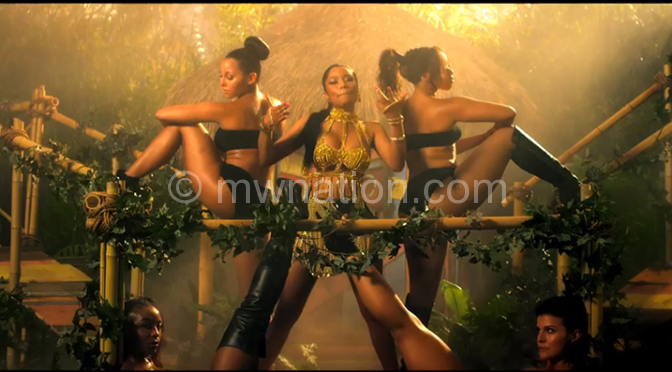Women objectified in music videos?
Women are objectified in music videos, especially in hip hop and rap; from sexy dressing, speaking in seductive tones to acting and dancing in a sexual manner.
“It’s the perfect portrayal of women as sex objects. Why women constantly need to be exposed or half-naked is beyond me. Is it to sell albums, or to further impose the idea of a woman as being the object of a male’s pleasure? quizzes music fan Mercy Banda of Ndirande Township in Blantyre.

She says sometimes in music videos, the woman’s face is not shown, instead, her body, especially her buttocks become a showpiece and is put on display.
“It angers me a lot as these videos depict a woman as not having an identity or a sense of individualism thus, reinforcing a woman’s role in society as a sex symbol,” she urges.
South African author, Erving Goffman in his book, Gender Advertisements agrees with Banda’s sentiments.
“Women’s bodies are often dismembered and treated as separate parts, perpetuating the concept that a woman’s body is not connected to her mind and emotions,” states the sociologist.
He says for example, certain body parts like the woman’s breast, her buttocks or her legs would be emphasized in music videos or on stage performances while her face is not shown at all.
For a longtime, a woman has become a subject of many things both good and bad in the world. For example, we cannot talk about poverty and HIV/Aids pandemic without mentioning them as the most vulnerable groups.
Almost at the centrestage of every global challenge, be it climate change, population boom or economic meltdown, there is a female face. But is this why the world of entertainment in Malawi also uses the female form to tackle different societal issues?
“Not all artists portray women as objects,” a local artist argues. “Some of us potray women as the most beautiful and loving creatures on this planet. Imagine, a world without a mother or wife who soothes you in times of trouble or gives you hundred reasons to smile.”
However, music lovers Society interviewed said a majority of artists continue to portray women as sinners and sex objects.
Some industry experts argue that music is all about money. They say that money can build or destroy morals or drive some people crazy.
But if Malawians are to draw a lesson from abundant music videos in which women are paraded almost naked, one is left with an impression that money is the driving factor for women to dance in the video semi-nude.

In other words, women are increasingly becoming slaves of their actions as well as a centre of controversy such as blame game whenever something goes wrong in love or society, as a whole.
For instance, whether some music compositions are influenced by anger or vengeance, women are being attacked left, right and centre as the most wrong-doers. Some songs go to the extent of demeaning women are weak characters in society, which is in sharp contrast with the gender related teachings that strive to empower a women as a subject which deserves equal treatment in society.
For example musician Saint sings about anxiety in love in one of his popular songs called Delilah. Ha partly sings: “Timano tako ukamasekelera/Timawu tako ukamandiyankhula/Timaso tako ukandiyang’ana/ Ndimaafa head/Timiyendo tako ukaponya step/Kambina kako mkumagwedezera/Timanja tako tikandikhudza….ndimadzifunsaa/Kuti sudzandidyera chuma change iwe?
(Delilaaah)/Sudzawazunza abale anga iwe (Delilaah)/Mkundipereka kwa adani iwe? (Delilaaah).”
Statements like ‘Sudzandidyera chuma change iwe?’, ‘Sudzawazunza abale anga iwe?’ and ‘Mkundipereka kwaadani iwe?’ potray a woman (Delilah) as some fortune seeker, wicked and someone who is not worth the trust in love.
Another musician Young D has also released a song titled Mkazi Oipa which features E-Word, Genii Blakki and Nepman. Basically, the song dismisses a woman as some evil for breaking a promise in love.
While money continues to dictate behaviours of some women such as dressing and dancing half-naked in the music videos, some young women defend their rights to freedom of expression.
“Art has nothing to do with morals,” says musician Ritaa.
Recently, the female emcee released artwork for her hitsong Winner, in a revealing swimsuit which exposed her thighs. Ritaa’s fans reacted coldly to the artwork, branding it as soft porn.
But Ritaa shot back, arguing the artwork was in line with her music brand.
“The artwork has nothing to do with my morals, but an attempt to defend and celebrate my power as a woman,” she told the media.
Gender activist Jessie Kabwila, in her 2012 Lead Pan-African presentation on on Gender and Climate Change, decries songs that are gender insensitive.
She argues that such songs portray women as weak, victims, worthless and powerless.
“Music must champion gender equality,” the lawmaker said. She criticises Lucius Banda’s Zakukhosi, Zili Ndi Iwe and Wa CV by Maskal and Coca Cola by Organised Family from Zambia for potraying women as weak.
“Music has power to shape thinking or decisions of people towards women. So, when women are portrayed as insignificant, society accepts this gradually,” she argues.





